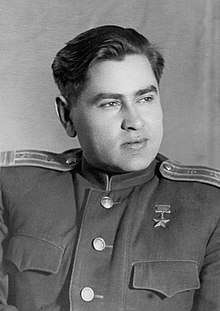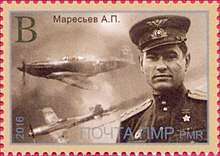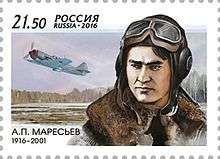Aleksey Maresyev
Aleksey Petrovich Maresyev (Russian: Алексей Петрович Маресьев; 20 May 1916 – 19 May 2001) was a Russian military pilot who became a Soviet fighter ace during World War II despite becoming a double amputee.
Aleksey Maresyev | |
|---|---|
 | |
| Born | 20 May [O.S. 7 May] 1916 Kamyshin, Saratov Governorate, Russian Empire |
| Died | 19 May 2001 (aged 84) Moscow, Russia |
| Allegiance | |
| Service/ | |
| Years of service | 1937–1946 |
| Rank | Colonel |
| Unit | 63rd Guards Fighter Aviation Regiment |
| Battles/wars | World War II |
| Awards | Hero of the Soviet Union |
Biography
Before joining the army in 1937 Maresyev worked as a turner and then participated in the construction of Komsomolsk-on-Amur.
In 1941, he graduated from the Bataysk Military School of Aviation. He began his flights as a fighter pilot in August 1941. He had shot down four German aircraft by March 1942.
On 5 April 1942 his Yakovlev Yak-1 was shot down near Staraya Russa, probably by future Knight's Cross holder and 48-kill ace Peter Siegler,[1][2] after which he was almost captured. Despite being badly injured, he managed to return to the Soviet-controlled territory. During his 18-day-long journey his injuries deteriorated so badly that both of his legs had to be amputated above the knee. Before the surgery he was lying on a stretcher with a sheet over his face and considered to be a hopeless case due to the extent of his injuries in addition to suffering from gangrene and blood poisoning. One doctor offered to operate on him and thereby saved him, but told him he would not lose his legs. Upon waking up from anesthesia, he was angered to find that his legs had been amputated above the knee.[3] Desperate to return to his fighter pilot service, he subjected himself to nearly a year of exercise to master the control of his prosthetic devices, and succeeded at that, returning to flying in June 1943.[4]
During a dog fight in August 1943, he shot down three German Focke-Wulf Fw 190 fighters. In total, he completed over 80 combat sorties and shot down an estimated 7 German aircraft.[5] He was awarded the title Hero of the Soviet Union on 24 August 1943. In 1944, he joined the Communist Party and in 1946 he retired from the military.
Postwar
In 1952, Maresyev graduated from the Higher Party School. In 1956, he obtained a Ph.D. in History and started working in the Soviet War Veterans Committee. Eventually, he became a member of the Supreme Soviet.
He suffered a heart attack on 18 May 2001 and died 16 hours later, just an hour before the celebration of his 85th birthday.[6]
Remembrance


| External images | |
|---|---|
His story served as a basis for the novel by Boris Polevoy The Story of a Real Man and a subsequent film (1948) directed by Aleksandr Stolper, in which his name was changed to Meresyev. The novel also inspired Sergei Prokofiev's last opera The Story of a Real Man. In 2005 a documentary called Alexey Maresyev. The Fate of a Real Man was produced by Channel Russia.
The asteroid 2173 Maresjev is named in his honor.
Awards and decorations
- Hero of the Soviet Union
- Order of Merit for the Fatherland 3rd class
- Two Order of Lenin
- Order of the Red Banner
- Order of the October Revolution
- Order of the Patriotic War 1st class
- Two Order of the Red Banner of Labour
- Order of Friendship of Peoples
- Order of the Red Star
- Order of the Badge of Honour
- Medal "For Distinction in Guarding the State Border of the USSR"
- Medal "Veteran of Labour"
See also
- Gheorghe Bănciulescu – a Romanian aviator, the first pilot in the world to fly with his feet amputated
- Douglas Bader – a World War II Royal Air Force fighter pilot with amputated legs
- Zakhar Sorokin – Soviet pilot who flew with both feet amputated
- Ma Ning – a Chinese pilot and Commander of the PLAAF, inspired by the story to fly despite one leg shorter than the other
References
- "Fw. Peter Siegler details".
- "Fw.Siegler was the only Luftwaffe pilot claiming I-16 that day(04 Apr 1942), note that JG 54 was operating in the same area as A.P.Maresyev".
- ""Сел и полетел!" 20 мая легендарному лётчику Алексею Маресьеву исполнилось бы 95". Аргументы и Факты. 18 May 2011. Retrieved 6 August 2019.
- "Маресьев Алексей Петрович". Retrieved 27 March 2017.
- Bykov, Mikhail (2014). Все асы Сталина. 1936—1953 [Aces of Stalin. 1936–1953]. Moscow: Yauza. p. 751. ISBN 978-5-9955-0712-3. OCLC 879321002.CS1 maint: ref=harv (link)
- "Настоящий Человек. Алексей Маресьев". Komsomolskaya Pravda. Retrieved 6 August 2019.
External links
| Wikimedia Commons has media related to Alexei Maresiev. |
- Story of a Real Man at Internet Archive (full text, English)
- Obituary in the New York Times